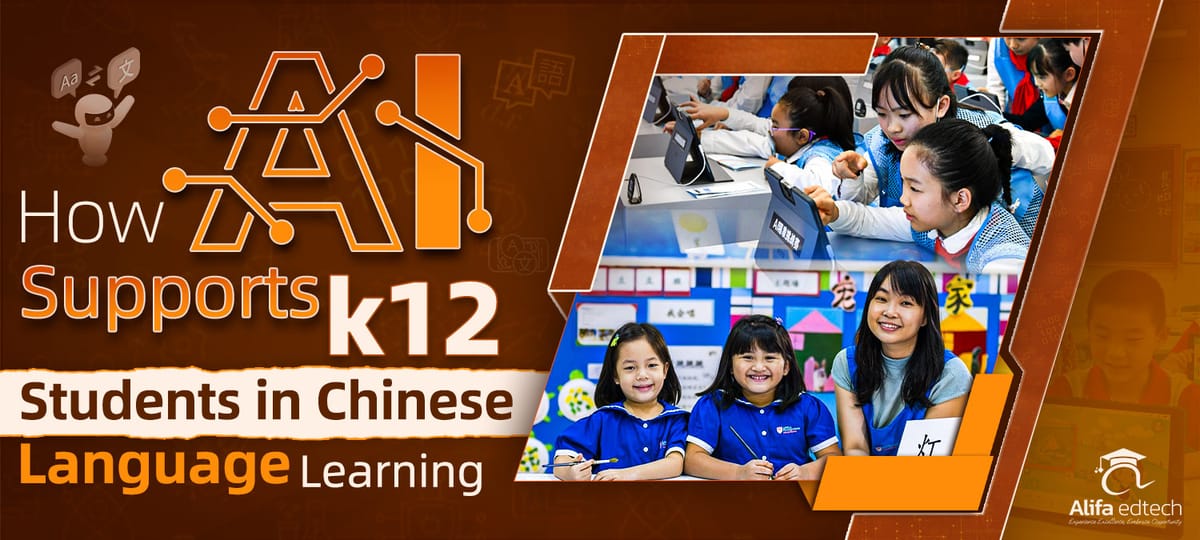In China’s K-12 international schools, digital transformation is happening fast. Artificial intelligence, especially AI chatbots, is changing the way schools communicate and operate. Parents, who often move globally, expect schools to keep up with technological advances. Schools are stepping up to meet these demands.
The future of education is here with AI-supported education reforms. These changes are part of a larger push towards a digital economy. Schools are embracing AI to create smarter educational settings. They’re not upgrading—they’re undergoing a comprehensive upgrade. This means better learning experiences for students and more efficient administration for schools.
In this article, you’ll see how AI is reshaping education in China and beyond. We’ll explore the role of AI chatbots in supporting students and engaging parents. You’ll learn how these tools are part of broader educational reforms and what this means for the future and how Alifa Education Services offers a smooth pathway for families seeking world-class learning opportunities. They connect students with creative learning tools that can redefine education.
If you’re interested in how technology is transforming learning, this is for you. No matter if you’re a parent, student, or teacher, knowing these changes helps you stay ahead. Let’s dive into how AI is making education more dynamic and interactive.
Alifa Education Services bridges ed-tech entrepreneurs and policymakers with China's leading AI companies. Get matched with the perfect technology partner for your region.
Book Your Partnership Consultation Today!
Tell us your needs—we'll find your ideal Chinese AI firm match.
Integration of AI into China's education system
China is making swift progress in embracing AI in education. Thanks to government support, schools are using new tools. This change aims to improve learning for both students and teachers through the following ways:
Personalized Learning Revolution with AI
The Chinese government is pushing for an AI-based education system in secondary schools. By using large-scale AI models, schools offer personalized learning experiences. AI chatbots play a big role. They provide tailored support for students, enhancing their learning journey. This change is part of larger education reforms. Government agencies and Xi Jinping's vision support these reforms.
Enhancing Teacher Capabilities through AI Tools
AI tools empower teachers in secondary education. They help with lesson planning and tracking student progress. The Chinese Academy of Sciences supports this integration. Teachers can now focus on student engagement. AI chatbots assist by handling routine queries. This allows teachers to have more time to nurture critical thinking and creativity.
AI-Powered Administrative Efficiency
Schools are adopting AI for administrative tasks. This leads to improved efficiency. AI chatbots manage inquiries from students and parents with ease. The annual sessions by government agencies highlight AI's role in education. Reduced administrative burdens mean more resources for direct student support. It’s a win-win for everyone involved.
Navigating Ethical Concerns in AI Education
Adopting AI in education raises ethical questions. Privacy and data security are top concerns. The Chinese government is mindful of these issues. Policies are in place to safeguard student information. Schools should practice transparency. Educators use AI to promote educational equity, ensuring fairness for all students.
AI and the Role in Educational Equity
AI aims to level the playing field in education. By providing accessible resources, it supports students from diverse backgrounds. AI chatbots enhance this by offering 24/7 help. The focus is on inclusive learning environments. China commits to reforming education to ensure that it leaves no student behind.
AI-Powered Tools Transforming Classroom Dynamics in China
China's classrooms are embracing AI-powered education. Technology is changing learning from Hubei Province to Hong Kong. It is making classrooms more active for students and teachers through:
Interactive AI Learning Platforms
AI-powered classroom technologies are redefining how students learn. Platforms like Squirrel AI, which are popular in China, enhance the learning process. They provide real-time answers, support multilingual learning, and encourage independence. These platforms use a lot of data to customize lessons for each student. This helps students participate more and understand better.
Want to put your brand in front of families, students, and education-focused readers? We're inviting select partners to advertise with us on our trusted blog.
Want to get featured? Click 'Learn more' and submit a story for us to include.
Smart Tutoring Systems and AI
Smart tutoring systems are transforming education. AI-powered analytics tools personalize learning, reinforcing lesson content. They offer instant feedback, helping students grasp complex concepts. These systems reduce teacher workload by automating routine tasks. International schools focus on multilingual education. They make sure that every student stays up to date in their studies.
AI-Driven Classroom Management Solutions
AI-driven classroom management tools streamline administration. They track student engagement and participation. By analyzing learning patterns, they help teachers adjust their strategies. This leads to a more focused and efficient classroom environment. Student privacy is a priority. We have tools that ensure data protection and adhere to ethical standards.
Virtual Reality and AI in Education
Virtual reality, combined with AI, is making learning immersive. Students explore environments beyond textbooks. In Hubei and Hong Kong, schools use VR to boost lessons. This helps students enhance their creativity and develop critical thinking skills. These experiences make learning engaging and memorable. AI ensures content is relevant and tailored to educational goals.
AI Tools for Real-Time Feedback and Assessment
AI tools provide real-time feedback, revolutionizing assessment methods. They track student progress, offering instant insights. Teachers receive detailed reports, guiding their teaching approach. Students enjoy immediate feedback, improving their learning outcomes. These tools lighten the load for teachers. So, they have more time to focus on personalized instruction and help students.
AI Chatbots in Enhancing Guardian Engagement
AI chatbots are transforming how schools connect with parents. They communicate 24/7. They give real-time updates and help with language gaps. This builds stronger relationships between schools and families in the following ways:
Real-Time Communication with Parents
AI chatbots make communication fast. They provide useful updates on school events and activities right away. They answer FAQs, schedule meetings, and provide updates. Schools in Hong Kong use chatbots to connect with parents. This helps balance technology and personal interaction. This approach keeps families informed and involved.
Personalized Updates on Student Progress
Parents receive personalized updates on their children's learning pace and achievements. AI-powered analytics tools track an individual student's progress, offering detailed reports. Schools in advanced manufacturing regions use these insights to support cross-disciplinary problem-solving skills. Parents stay connected, understanding their children's academic journeys better.
Bridging Language Barriers in International Schools
Chatbots bridge language barriers in diverse international schools. They offer translation services, making communication seamless for non-native speakers. Parents from different backgrounds receive information in their preferred language. This inclusivity builds a friendly atmosphere. It encourages families and school staff to connect better. As a result, everyone remains informed.
Streamlining Administrative Inquiries
Chatbots simplify administrative tasks by handling routine inquiries. They provide instant answers about school policies, schedules, and more. This efficiency frees up staff time for more critical tasks. Schools in the Philippines and Myanmar use chatbots. This helps them achieve smoother operations. It also boosts communication and makes the organization more effective.
Building Trust and Transparency in Education
AI chatbots build trust by maintaining transparency in communication. Parents receive honest and timely updates, cultivating a sense of reliability. Schools using chatbots, like those in India, show a commitment to transparency. This trust builds a strong link between families and schools. It helps create a teamwork-focused learning environment.
AI-Driven Personalized Learning in China's K-12 Schools
AI transforms education in China by offering personalized learning experiences. It adjusts to how each student learns. This boosts interest and gets them ready for future challenges by:
Tailoring Education to Individual Needs
AI tailors education to fit individual learning styles. By tracking student performance, it offers personalized learning experiences that support secondary students. This approach cultivates each student's potential, enhancing their problem-solving abilities. Schools in China use AI to ensure every student receives the attention they need to thrive.
Real-Time Feedback and Adaptive Learning
Students get real-time feedback through AI chatbots. This adaptive learning helps them understand complex topics better. Parents get updates about their children's progress. This lets them help with their learning journey. Teachers adjust their methods based on feedback, promoting effective and creative learning experiences.
Enhancing Student Engagement and Motivation
AI enhances student engagement by making learning interactive. Through design thinking and critical thinking tasks, students stay motivated. They gain confidence in tackling new challenges. Schools in Hong Kong and India use AI to engage students. This helps create a lively classroom environment.
Integrating AI with traditional teaching methods.
AI integrates with traditional teaching in a way that creates a balanced approach. It supports teachers by providing insights into student progress. This approach allows creative learning experiences while preserving traditional education's core strengths. Teachers in Myanmar find this blend effective in cultivating students' skills.
Preparing Students for a Digital Economy
AI helps students get ready for a digital economy. It teaches them critical thinking and problem-solving skills. These skills are crucial in today's world. Schools in the Philippines focus on cultivating students to meet future demands. AI ensures they are ready, giving them a head start in their careers.
The Role of AI Chatbots in Supporting Students and Parents
AI chatbots are transforming education. They support academics and link schools with families. This helps create a smooth learning experience by:
Enhancing accessibility and availability.
AI chatbots provide 24/7 support, making information accessible for parents and students. They reduce wait times for responses and enhance communication. Schools in India use large-scale AI models. This keeps parents informed. As a result, trust between home and school grows. It also helps support the learning process.
Facilitating homework and study assistance.
Students get homework help through AI chatbots. These tools guide them through difficult topics, enhancing their learning process. Schools in Hong Kong use AI models to support students. These tools help develop creative skills and boost critical thinking. This support boosts students' confidence and academic success.
Providing Emotional and Mental Health Support
AI chatbots offer emotional support, helping students manage stress. They provide resources and listening ears when needed. Schools in the Philippines use chatbots for mental health support. This helps students find a safe space. This holistic approach fosters a supportive learning environment for everyone.
Streamlining communication between teachers and parents
AI chatbots streamline communication between teachers and parents. They relay important updates and reduce response times. This transparency builds trust and keeps parents engaged. A new survey found that strong talks between schools and parents help kids learn better and build stronger skills. This benefit supports students' growth and key abilities.
Offering Personalized Career Guidance
AI chatbots offer personalized career advice, helping students explore future paths. They use insights from large-scale AI models to tailor guidance to individual interests. Schools in Myanmar aim to prepare students for tough job markets. They want to make sure students are ready for future challenges and opportunities.
Conclusion: The Future of AI in China's International School Curriculum
AI is reshaping China's educational landscape. Future curricula will include AI literacy, chatbot interaction, and digital communication skills. AI counseling bots and emotion-recognition tools are coming soon. They align with changes in education that AI supports. Chinese universities are leading these innovations, boosting core competitiveness in the digital economy.
The Chinese government supports this vision, ensuring students are ready for tomorrow. School-family communication is evolving to enhance transparency and efficiency. The future of education looks promising, driven by artificial intelligence. Embrace these changes, and watch education transform in the AI era.
Ready to take the next step in your child’s education journey? Alifa Education Services helps you discover top junior and secondary schools in China. We help families every step of the way. We handle school selection, visa support, and ongoing care. This makes the process easy and stress-free. Let’s give your child the best start. Book a free consultation today!
Related Articles














Member comments